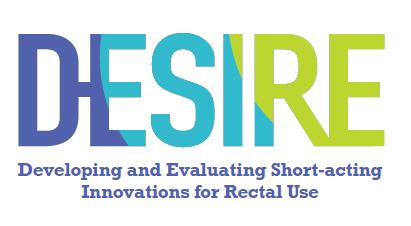New study explores three delivery methods for rectal microbicides

Credit: MTN
Sometimes a well-made shirt can look great on a hanger, but it’s an entirely different experience when you handle the shirt and head to the fitting room to try it on. Maybe it’s the color, the fit or even the fabric. It’s the same with HIV prevention products: A product may seem great because it’s highly effective, but if it’s not the right fit in your life, you may decide not to use it at all.
Recognizing the major role personal preferences play in HIV prevention, the National Institutes of Health (NIH)-funded Microbicide Trials Network (MTN) has launched a rectal microbicide study that asks participants to “try on” potential approaches before actual products are developed. The study, MTN-035, or DESIRE (Developing and Evaluating Short-acting Innovations for Rectal Use), is the first to systematically examine placebo, or inactive, methods for delivering drugs to help prevent HIV from receptive anal sex.
In DESIRE, study participants will use three placebo products rectally – a douche, a suppository and an insert (fast-dissolving tablet inserted into the rectum) – and report whether they would use the product if proven effective (acceptability and tolerability). Researchers also will assess the safety of each method and will evaluate and compare whether participants used the products correctly and consistently (adherence).
“We are entering a new era of HIV prevention in which we are beginning to acknowledge that individual preferences are extremely relevant to actual product use,” said José A. Bauermeister, Ph.D., M.P.H., MTN-035 protocol chair and professor, University of Pennsylvania School of Nursing. “We can no longer assume if products work, people will use them. The approach used in DESIRE will instead assess participants’ experiences using different rectal delivery methods before specific products have been developed.”
During DESIRE, study participants will use each rectal delivery modality for a month at a time, with a week-long break in between. They will be asked to use the methods between 30 minutes and 3 hours prior to engaging in receptive anal sex, or once a week for participants who have not engaged in receptive anal sex in a given week. The three delivery methods are a placebo insert approximately two-thirds of an inch in length, a placebo suppository approximately an inch and a half in length, and a commercially available 120 mL douche bottle that participants will be instructed to fill with clean tap or bottled water prior to use.
The study will include 210 HIV-negative cisgender men, transgender men and transgender women who have sex with men at sites in Malawi, Peru, South Africa, Thailand and the United States. In addition to general acceptability, tolerability and adherence, researchers are interested in finding out whether different segments of the study population prefer some rectal delivery methods over others.
“Participants in other studies have indicated that they are excited about the idea of topically applied rectal products for HIV prevention,” said Craig Hendrix, M.D., director, rectal microbicide research, MTN and professor, Johns Hopkins University School of Medicine. “We also know that rectal douching is a common practice around the time of anal sex. This makes DESIRE an interesting and important study that will directly impact the development of intervention strategies in future rectal microbicide drug trials.”
MTN-035 is being conducted at the following trial sites, pending necessary approvals: the Blantyre Clinical Research Site (CRS) in Malawi; the IMPACTA CRS in Lima, Peru; the Wits Reproductive Health and HIV Institute in Johannesburg, South Africa; the Chiang Mai University HIV Prevention CRS in Thailand; and, the University of Pittsburgh CRS, the Bridge HIV CRS in San Francisco, and the University of Alabama at Birmingham CRS in the United States.
The MTN is funded by the National Institute of Allergy and Infectious Diseases (NIAID), the Eunice Kennedy Shriver National Institute of Child Health and Human Development and the National Institute of Mental Health, all part of the NIH. The placebo rectal insert used in the study was developed by CONRAD, a not-for-profit research and development organization located in Arlington, Va.
Rectal microbicides are products – that could take the form of gels, douches, fast-dissolving rectal inserts or suppositories – being developed and tested to reduce a person’s risk of HIV or other sexually transmitted infections through anal sex. MTN-035 is part of a larger program at the MTN to test new potential products and delivery methods for HIV prevention for people who practice anal sex.
###
The MTN is funded by the U.S. National Institutes of Health grants UM1AI068633, UM1AI068615, UM1AI106707. CONRAD’s support for MTN-035 and provision of the placebo insert is made possible by the generous support of the American people through the U.S. Agency for International Development/U.S. President’s Emergency Plan for AIDS Relief.
About the Microbicide Trials Network
The Microbicide Trials Network (MTN) is an HIV/AIDS clinical trials network established in 2006 by the National Institute of Allergy and Infectious Diseases with co-funding from the Eunice Kennedy Shriver National Institute of Child Health and Human Development and the National Institute of Mental Health, all components of the U.S. National Institutes of Health. Based at Magee-Womens Research Institute and the University of Pittsburgh, the MTN brings together international investigators and community and industry partners whose work is focused on the rigorous evaluation of promising microbicides – products applied inside the vagina or rectum that are intended to prevent the sexual transmission of HIV – from the earliest phases of clinical study to large-scale trials that support potential licensure of these products for widespread use. More information about the MTN is available at https:/
Media Contact
Clare Collins
[email protected]
Original Source
https:/




